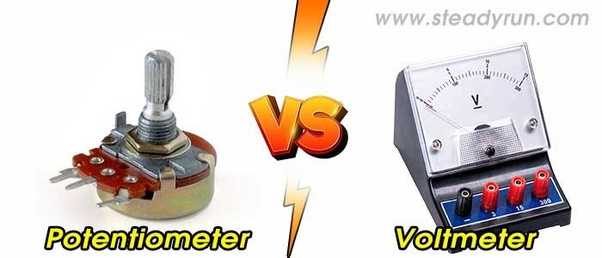
Explore 10 Key Difference between potentiometer and voltmeter
The dissimilarities between potentiometers and voltmeters are striking, emphasizing their divergent functionalities and characteristics. Here, we unveil ten key difference between potentiometer and voltmeter that set them apart, elucidating their individual roles within the realm of electrical measurements.
10 Difference between potentiometer and voltmeter
Goal: Their main goals are where there is the most contrast. By serving as a variable resistor, a potentiometer is used to measure and adjust the voltage level in a circuit. A voltmeter, on the other hand, is used exclusively to measure the electrical potential difference.
Circuit placement: To adjust the voltage across the circuit being studied, potentiometers are frequently wired in series with the circuit. To measure the potential difference directly, voltmeters are typically connected in parallel across the component or circuit under consideration.
Design: To enable variable resistance, potentiometers have a resistive element and a movable wiper that slides along the resistive track. The internal circuitry of voltmeters, on the other hand, is calibrated for measuring voltage and they are made to function as standalone devices.
Scale: Potentiometers typically come with an adjustable scale that allows for precise voltage level control and regulation. Voltmeters, on the other hand, lack adjustability and have fixed scales that provide accurate voltage readings.
Range: Potentiometers frequently have a wide voltage adjustment range, enabling fine-grained control over a wide range of applications. On the other hand, voltmeters are limited in what they can measure because of the specific voltage ranges that went into their design.
Connection to the Circuit: Potentiometers are directly integrated into the circuit being studied, making it possible to manipulate and modulate voltages in real time. Voltmeters, on the other hand, are only briefly connected to the circuit in order to perform a measurement before being unplugged.
Sensitivity: Potentiometers are incredibly sensitive instruments that can detect and react to even the smallest voltage changes. In contrast, potentiometers frequently have higher sensitivity than voltmeters, which are designed to give precise readings with high precision.
Accuracy: Although potentiometers are reasonably accurate for controlling voltage, they may not be as precise as specialised measuring tools. Voltmeters that are made specifically for measuring voltage usually have readings that are more accurate.
Circuit Disruption: Due to their variable nature, potentiometers have the potential to add extra resistance and alter the general characteristics of the circuit. Voltmeters, on the other hand, have a minimal effect on the behaviour of the circuit due to their high input impedance.
Applications: Potentiometers are widely used in analogue control circuits, audio systems, light dimmers, and other areas where voltage adjustment is important. On the other hand, for precise voltage measurements, voltmeters are frequently used in electronics labs, power distribution systems, and troubleshooting scenarios.
The contrasting functions and qualities of potentiometers and voltmeters can be understood by separating these ten discrepancies. We can effectively harness each of their potentials, whether for accurate measurements or fine-tuning voltage, by comprehending their distinct characteristics.
Also Read: Discover 15 Key Difference between Measurement and Evaluation